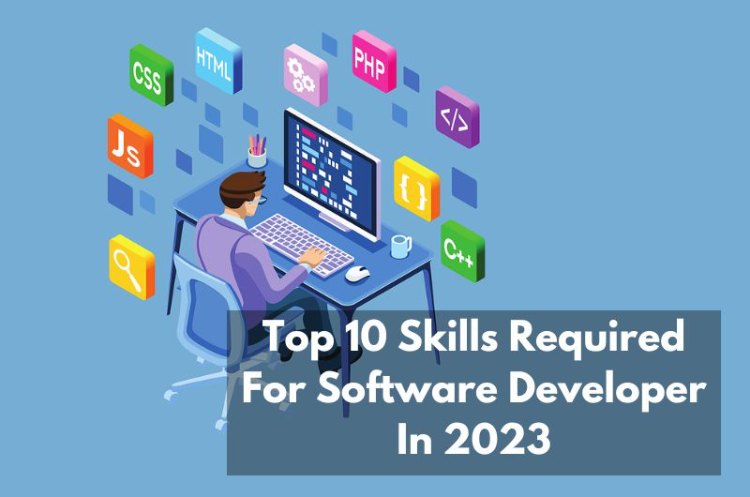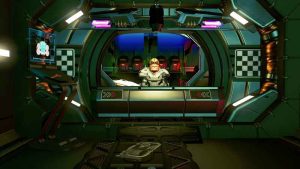Top 10 Skills Required For Software Developer In 2023

Top 10 Skills Required For Software Developer In 2023
The World of software development skills is constantly changing. For this reason, it’s crucial to keep up to date with all new tools, languages, and trends as they emerge. To make it easier, we’ve compiled a list of the ten most crucial skills required for software development in 2023.
Table of Contents
1. Containerization
Containerization is the process of packaging applications into containers and sending them to production. As a software developer, you need to understand the importance of containerization to keep up with modern technology trends, as your organization will likely use containers at some point in its development cycle.
The first step to learning more about container orchestration is to understand what a registry is and why it’s essential for software developers in 2023 and beyond to understand the following: A container registry keeps track of all available images and can rummage sales for container deployments. That makes it easier to manage large containers without manually configuring each host for every host deployed by an organization. It also ensures that any changes made are propagated across all instances immediately. Therefore, there is no inconsistency between builds running concurrently on machines in different locations or environments (e.g., test and production).
2. Linux Sysadmin
The Linux operating system is ubiquitous: it is the operating system of choice for most cloud providers, enterprises, and developers. As a result, there is a growing demand for Linux system administrators who can manage the infrastructure for these applications and platforms.
You can work with or on behalf of others in professions like DevOps (developer + operations) or infrastructure architecture and manage your systems. The same person frequently fills these positions.
3. Distributed Systems Architect
Distributed systems are becoming more common. They’re a great way to scale your system but require more expertise than a traditional monolithic application.
I won’t go into detail about what constitutes a distributed system, as there are many resources on the subject, but here is my simplified version:
A distributed system is a system in which multiple processes communicate on separate machines. That can be skillful using synchronous communication protocols such as TCP/IP or asynchronous protocols such as HTTP and Web Sockets. If you create an application that uses either protocol, you are effectively creating a distributed system, even if it doesn’t meet all the technical requirements to be considered one.
The main conclusion is that these applications are much more complex to manage than their monolithic counterparts since several elements (processes) work together simultaneously and not a single process with everything in it.
4. Docker DevOps
Docker DevOps is a way to build, test, and deploy applications faster and more reliably. It helps improve the app development process by reducing the time it takes to compile and test code and improves reliability by allowing less human error during deployment.
In addition to these direct benefits, Docker also provides indirect benefits through better collaboration between different teams (e.g., product managers) who want to collaborate on various projects throughout the development lifecycle (i.e., from idea to launch).
The fact that you can share your source code with others without compromising security is also a benefit, as it allows multiple people from different departments within an organization to implement z next without having access to the code. Other. That can help reduce the time it takes for teams to start new projects, which is especially useful in fast-paced environments where time is at a premium.
5. AI
AI is a big problem. Or at least for anyone interested in software development. AI (Artificial Intelligence) is a buzzword that has been around since the 1950s but has only recently made headlines. In 2023, it will be even more severe than it is today, and it will become an essential skill that all developers must learn because you can’t stay competitive without knowing these things!
AI has many meanings: it can refer to computers that work alone without human intervention, machines that work in collaboration with humans, or computer systems that mimic human intelligence by learning from experience.
This newest category of machines, known as “Narrow AI,” is already here and growing, with improvements being made every day in every imaginable industrial sector, including healthcare, finance, transportation, and retail, to name just a few instances of where AI applications are currently deployed.
6. Programming Languages
To become a good programmer, you must thoroughly understand at least one programming language. So, deciding which programming language to choose depends on your area of interest and the language you like to solve problems in or are well versed in. According to the Stack Overflow survey, let’s look at the popularity of programming languages in 2019.
You can select any programming language from the above image, market demand, and area of interest. Read the article Top 10 Programming Languages in the World to help you decide which programming language to choose.
7. Source Control
Source control helps the developer to manage and store their code. Most companies today are looking for a developer who is knowledgeable about version control and will work alongside other team members. So if you plan to become a good software developer, you should be familiar with version control concepts and tools like Git (preferred by 70-80% of the organization), Mercurial, SVN, etc. Read this article to learn more about source control. Git and GitHub.
8. Text Editors
It is an indispensable tool in the programmer’s daily life. Not only programmers but also non-programmers use text editors for their purposes. Many text editors like Notepad++, Visual Code, Sublime Text, Atom, Brackets, etc. All programmers, especially beginners, should spend time learning a text editor and some keyboard shortcuts to become competent and productive developers.
9. IDEs (Integrated Development Environment)
When choosing the best development environment, different programmers have different options for other purposes or languages they are working on. Every computer operator should know how to use IDEs to write, compile, run, and debug their code. Using an IDE speeds up your work, and there are many IDEs for developers. The most recommended option for C, C++, and C# programmers is Visual Studio or Code::Blocks. PyCharm, Spyder, and Jupyter Notebook are also gaining popularity among Python developers.
10. Databases
An essential skill for developers is to understand how to work with databases. Developers should be familiar with all types of operations, e.g., B. store records, create, insert, update, delete, etc. Developing applications and software is impossible for any organization without a database. When a developer is working on a serious business project, he should also take care of security issues and keep the registry of the entire organization adequately backed up. For this reason, every organization expects a developer familiar with databases and securely managing all records. Undoubtedly, SQL is the most popular classic database among developers. To be a good developer, you need to know how to write basic SQL queries—Oracle, PostgreSQL, MongoDB, Cassandra, Redis, etc.
Conclusion
We believe these are the most critical developmental skills for developers in the coming years. With AI ubiquitous and more people using containers and Linux, these skills are in high demand across all industries.
Also read: How To Edit Photos For Instagram
Also read: LMAO Meaning




